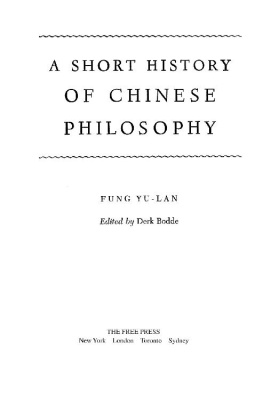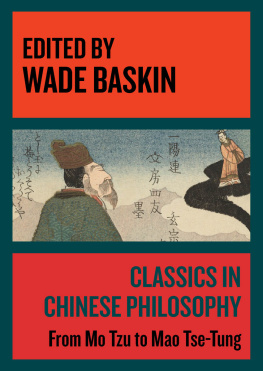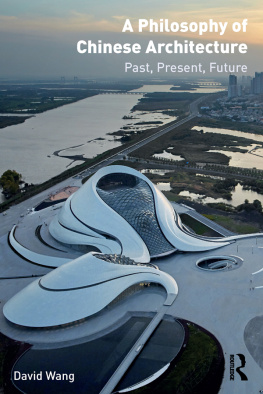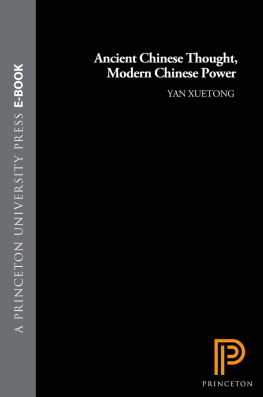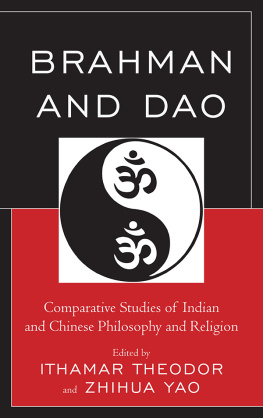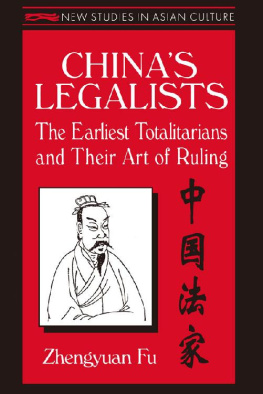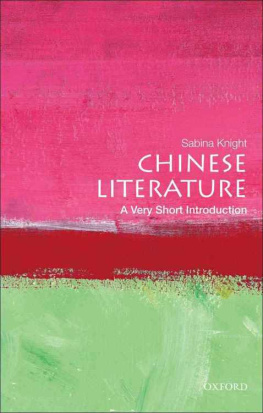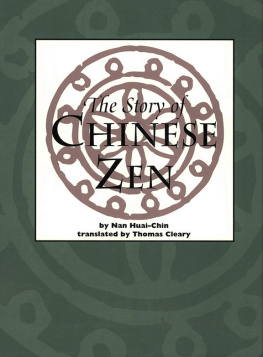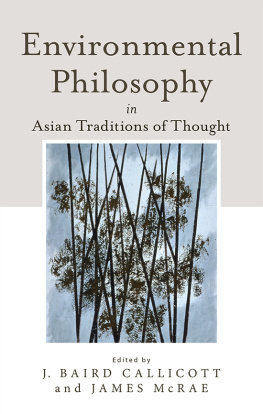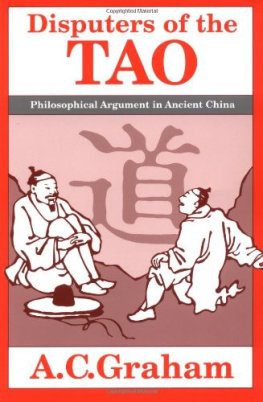[ The Chinese title by Mrs. Fang Chao-ying ]
Thank you for downloading this Free Press eBook.
Join our mailing list and get updates on new releases, deals, bonus content and other great books from Free Press and Simon & Schuster.
C LICK H ERE T O S IGN U P
or visit us online to sign up at
eBookNews.SimonandSchuster.com
CONTENTS
Place of Philosophy in Chinese Civilization. Problem and Spirit of Chinese Philosophy. The Way in which the Chinese Philosophers Expressed Themselves. The Language Barrier.
Geographic Background of the Chinese People. Economic Background of the Chinese People. Value of Agriculture. Reversal Is the Movement of Tao . Idealization of Nature. Family System. This-worldliness and Other-worldliness. Chinese Art and Poetry. The Methodology of Chinese Philosophy. Maritime Countries and Continental Countries. The Permanent and the Changeable in Chinese Philosophy.
Ssu-ma Tan and the Six Schools. Liu Hsin and His Theory of the Beginning of the Schools. A Revision of Liu Hsins Theory.
Confucius and the Six Classics. Confucius as an Educator. The Rectification of Names. Human-heartedness and Righteousness. Chung and Shu. Knowing Ming . Confucius Spiritual Development. Confucius Position in Chinese History.
Social Background of the Mohist School. Mo Tzus Criticism of Confucianism. All-embracing Love. The Will of God and Existence of Spirits. A Seeming Inconsistency. Origin of the State.
The Early Taoists and the Recluses. Yang Chus Fundamental Ideas. Illustrations of Yang Chus Ideas. Yang Chus Ideas as Expressed in the Lao-tzu and Chuang-tzu. Development of Taoism.
The Goodness of Human Nature. Fundamental Difference between Confucianism and Mohism. Political Philosophy. Mysticism.
The School of Names and the Debaters. Hui Shihs Theory of Relativity. Kung-sun Lungs Theory of Universals. Significance of the Theories of Hui Shih and Kung-sun Lung.
Lao Tzu the Man and Lao-tzu the Book. Tao, the Unnamable. The Invariable Law of Nature. Human Conduct. Political Theory.
Chuang Tzu the Man and Chuang-tzu the Book. Way of Achieving Relative Happiness. Political and Social Philosophy. Emotion and Reason. Way of Achieving Absolute Happiness. The Finite Point of View. The Higher Point of View. Knowledge of the Higher Level. Methodology of Mysticism.
Discussions on Knowledge and Names. Discussions on Dialectic. Clarification of All-embracing Love. Defense of All-embracing Love. Criticism of Other Schools.
The Six Classes of Occult Arts. The Five Elements as Described in the Grand Norm. The Monthly Commands. Tsou Yen. A Philosophy of History. The Yin and Yang Principles as Described in the Appendices of the Book of Changes.
Position of Man. Theory of Human Nature. Origin of Morality. Theory of Rites and Music. Logical Theories. Fallacies of Other Schools.
Social Background of the Legalists. Han Fei Tzu, the Synthesizer of the Legalist School. Legalist Philosophy of History. Way of Government. Legalism and Taoism. Legalism and Confucianism.
The Principles of Things. The Tao of the Production of Things. The Tao of the Transformation of Things. The Mean and Harmony. The Common and the Ordinary. Enlightenment and Perfection.
Political Conditions Preceding the Unification by Chin. The Unification of China. The Great Learning. Eclectic Tendency in the Hsn-tzu. Eclectic Tendency in the Chuang-tzu. Eclecticism of Ssu-ma Tan and Liu Hsin.
The Amalgamation of the Yin-Yang and Confucianist Schools. Cosmological Theory. Theory of Human Nature. Social Ethics. Political Philosophy. Philosophy of History. Interpretation of the Chun Chiu. Three Stages of Social Progress.
The Unification of Thought. The Position of Confucius in Han Thought. The Controversy of the Old and New Text Schools. Yang Hsiung and Wang Chung. Taoism and Buddhism. Political and Social Background.
The Revival of Interest in the School of Names. A Reinterpretation of Confucius. Hsiang Hsiu and Kuo Hsiang. The Tao is Nothing. The Self-transformation of Things. Institutions and Morals. Yu-wei and Wu-wei. Knowledge and Imitation. The Equality of Things. Absolute Freedom and Absolute Happiness.
Feng Liu and the Romantic Spirit. Yang Chus Garden of Pleasure. Living According to Impulse. The Emotional Factor. The Factor of Sex.
Introduction and Development of Buddhism in China. General Concepts of Buddhism. The Theory of Double Truth. Philosophy of Seng-chao. Philosophy of Tao-sheng.
Traditional Account of the Origin of Chanism. The First Principle is Inexpressible. Method of Cultivation. Sudden Enlightenment. The Attainment of Non-attainment.
Han Y and Li Ao. Cosmology of Chou Tun-yi. Method of Spiritual Cultivation. Cosmology of Shao Yung. Law of the Evolution of Things. Cosmology of Chang Tsai.
Cheng Haos Idea of Jen. Origin of the Cheng-Chu Idea of Li. Cheng Yis Concept of Li. Method of Dealing with the Emotions. The Search for Happiness.
Position of Chu Hsi in Chinese History. Li or Principle. Tai Chi or the Supreme Ultimate. Chi or Matter. Nature and Mind. Political Philosophy. Method of Spiritual Cultivation.
Lu Chiu-yans Conception of the Mind. Wang Shou-jens Conception of the Universe. The Illustrious Virtue. Intuitive Knowledge. The Rectification of Affairs. Attentiveness of the Mind. Criticism of Buddhism.
Reaction Against Neo-Confucianism. Movement for a Confucian Religion. Introduction of Western Thought. Introduction of Western Philosophy.
The Philosopher and the Historian of Philosophy. Philosophical Production in Wartime. The Nature of Philosophy. The Spheres of Living. The Methodology of Metaphysics.
EDITORS INTRODUCTION
I N SPITE OF THE INNUMERABLE books that have been written about China in recent years, it is remarkable how little really authentic knowledge we in the West have about the philosophy of that country. Even most well-educated Americans, if asked to list some of Chinas major philosophers, will, unless they are China specialists, be unable to name more than Confucius and possibly Lao Tzu. This statement, I suspect, applies almost as strongly to the average professional teacher of philosophy as it does to the layman.
Books and articles in English on the subject are not lacking, to be sure, but with few exceptions they are either too specialized to be popular or too popular to have much value. The present volume, indeed, is the first in English that attempts to give a really comprehensive and systematic account of Chinese thought as a whole, from its beginnings with Confucius to the present day. The fact that it is the work of a Chinese scholar who is generally acknowledged by his countrymen to be supremely well qualified for the task, makes its appearance all the more significant.
As we read this book, we see that Chinese philosophy is far wider in scope than either Confucius or Lao Tzu, or even the Confucian and Taoist schools with which they are linked. In the course of some twenty-five centuries, Chinese thinkers have touched upon well-nigh all the major subjects that have engaged the attention of philosophers in the West, and though the schools to which they have belonged have often borne the same name through many centuries, their actual ideological content has changed greatly from one age to another. Could Confucius, for example, have been reincarnated through a Buddhist process of metempsychosis so as to meet his great twelfth century follower, Chu Hsi, he would probably hardly have guessed that the ideas preached by the latter were the orthodox Confucianism of that time.

